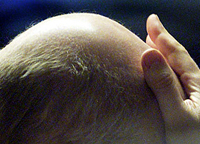Full scalp transplants from cadavers may cure baldness in future
The most effective current solution for baldness is hair-replacement surgery, in which follicles are painstakingly moved in small bunches from the thick hair on the back of the head to the barren acreage on top.

But what if it were possible to move an entire, full and durable scalp from another person, albeit a dead one, all at once?
That prospect set hundreds of hair-restoration specialists atwitter at a late-September scientific conference in Las Vegas, where transplantation expert Maria Siemionow presented research that many believe will make such a thing a reality one day.
Siemionow, who is renowned for her groundbreaking work in the field of facial transplants, said her team at The Cleveland Clinic has developed a treatment in lab animals that reduces the length of time any recipient must be on immunosuppressant drugs to just a week. Today, the recipient of any transplant must stay on fairly toxic and expensive medication for life, which makes it untenable to do transplants for anything less then life-essential organs. It remains untested in humans.
The scientist told her audience at the International Society of Hair Restoration Surgery's convention that her aim is to make full-scalp transplants possible for severe burn and trauma victims. But that didn't keep listeners from imagining the cosmetic applications.
"What she's talking about … has implications for the future in our field in terms of perhaps being able to move hair from one person to another," says Vance Elliott, a hair restoration surgeon from Canada. "We've always considered that impossible because the immune system rejects it."
Some may think such a move — to don the hair of a cadaver — would be extreme, but nobody should underestimate the determination of balding people to reverse the scourge of a receding hairline. Spending on hair-restoration surgeries in 2006 topped $1.2 billion worldwide, a figure that does not include spending on proven drugs such as Propecia and Rogaine or any number of disreputable gadgets and balms sold online or on late-night television.
And, with the exception of trauma or burn victims, virtually none of that spending is covered by health insurance. A full set of hair-replacement surgeries can cost as much as $10,000; Propecia can cost $50 a month, and Rogaine retails for about $20 a month, usatoday.com reports.
Pravda.Ru has previously published a number of articles about baldness.
German medics arrived at the conclusion that consumption of large caffeine doses prevents baldness.
Male's hormone testosterone is responsible for baldness in men, meaning that the more testosterone a man as, the more prone he is to losing his hair. Head of the research team Professor Peter Elsner states that hormonal boldness could in fact be prevented by means of caffeine.
As a result of their extensive research studies, German scientists arrived at a fascinating conclusion! Apparently, claim the scientists, it is possible to prevent baldness at an early age by means of treating hair with products containing caffeine (for instance by rubbing a special solution into the scalp).
Click here to read the full text of the article ‘Coffee to cure baldness’.
According to another Pravda.Ru article Scientists discovered mutated gene responsible for baldness.
From time immemorial there have been numerous attempts to find a cure for stupidity and baldness . Every year pharmaceutical and cosmetic companies spend millions of dollars on research and development of new methods of treatment based on the latest scientific achievements. However, the molecular mechanisms that control the growth of hair and its loss during baldness remain unclear.
Professor Evgeni Rogayev, a Russian biologist known for his research into genetic control mechanisms of mental processes, has identified a gene linked to hair growth impairment. Scientists discovered mutations in the gene while conducting a research into the causes of a disease characterized by the hair loss or its growth deficiency. The discovered gene codifies phospholipase, a ferment that occurs in hair follicles. The mutation discovered in the gene may shed light on the causes of baldness.
An article titled Human Hair Growth Deficiency Is Linked to a Genetic Defect in the Phospholipase Gene LIPH was published by Science journal in November. It is co-authored by Prof. Rogayev, Academician Evgeni Ginter at the Russian Academy of Medical Sciences in collaboration with geneticists at the Russian Academy of Sciences, Moscow State University, and the Medical School of the University of Massachusetts. By the bye, the above medical school’s annual budget is $174 million, with 80% of the budget provided from the federal coffers. It stands to reason that the school has become one of the most rapidly developing academic centers in the United States .
Click here to read the full text of the article.
Source: agencies
Subscribe to Pravda.Ru Telegram channel, Facebook, RSS!


